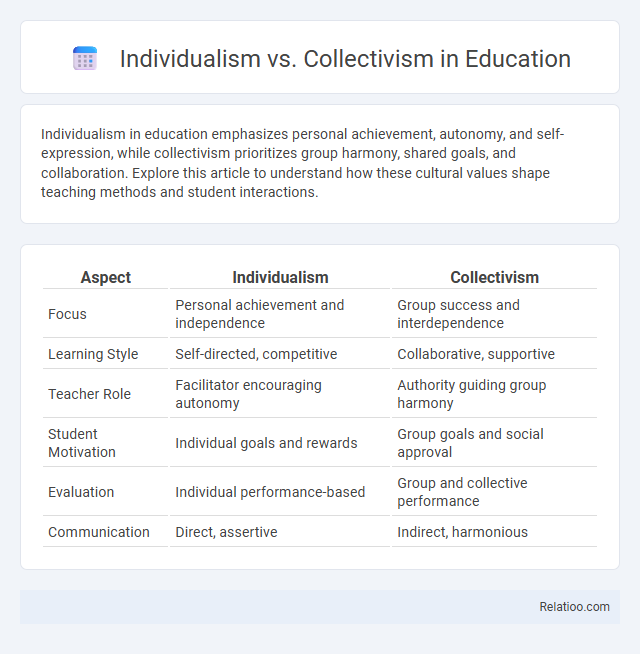Individualism in education emphasizes personal achievement, autonomy, and self-expression, while collectivism prioritizes group harmony, shared goals, and collaboration. Explore this article to understand how these cultural values shape teaching methods and student interactions.
Table of Comparison
| Aspect | Individualism | Collectivism |
|---|---|---|
| Focus | Personal achievement and independence | Group success and interdependence |
| Learning Style | Self-directed, competitive | Collaborative, supportive |
| Teacher Role | Facilitator encouraging autonomy | Authority guiding group harmony |
| Student Motivation | Individual goals and rewards | Group goals and social approval |
| Evaluation | Individual performance-based | Group and collective performance |
| Communication | Direct, assertive | Indirect, harmonious |
Understanding Individualism and Collectivism in Education
Understanding individualism and collectivism in education reveals how cultural values shape learning environments and student outcomes. Individualism emphasizes personal achievement, autonomy, and self-expression, encouraging students to develop critical thinking and independent problem-solving skills. Your education expectations may align with collectivist values, which prioritize group harmony, collaboration, and shared goals, fostering cooperative learning and community responsibility among students.
Historical Roots of Individualistic and Collectivist Approaches
The historical roots of individualistic education trace back to Renaissance humanism, emphasizing personal development, critical thinking, and self-expression, reflecting Western cultural values that prioritize autonomy and individual rights. In contrast, collectivist approaches are deeply rooted in Confucianism and Indigenous traditions, where education focuses on social harmony, community responsibility, and interdependence, aligning with cultural norms that value group cohesion and collective well-being. These differing origins influence education expectations, with individualism fostering independent achievement and self-directed learning, while collectivism promotes collaborative learning and communal success.
Key Characteristics of Individualistic Education Systems
Individualistic education systems emphasize personal achievement, autonomy, and critical thinking, encouraging students to develop independent problem-solving skills and self-expression. Your learning experience in these systems often prioritizes individual goals, competition, and personal responsibility over group harmony or collective success. This educational approach fosters creativity and innovation by valuing diverse perspectives and encouraging students to challenge existing ideas.
Core Features of Collectivist Educational Environments
Collectivist educational environments prioritize group harmony, cooperation, and interdependence, fostering a learning atmosphere where students work collaboratively and share responsibility for outcomes. These settings emphasize social connectedness and collective success over individual achievement, promoting respect for authority and community values. Your experience in such environments often involves learning through group activities that enhance social skills and reinforce cultural norms, contrasting sharply with the individualistic focus on personal goals and competition.
Influence of Culture on Classroom Practices
Cultural dimensions of individualism versus collectivism significantly shape classroom practices and education expectations, influencing student-teacher interactions and learning dynamics. In individualistic cultures, education emphasizes personal achievement, self-expression, and independent problem-solving, fostering competitive environments and personalized goals. Collectivist cultures prioritize group harmony, collaboration, and communal success, guiding classroom practices toward cooperative learning and collective responsibility.
Impact on Student Motivation and Achievement
Individualism in education emphasizes personal goals, autonomy, and self-expression, driving students to seek intrinsic motivation and excel independently. Collectivism prioritizes group goals and collaboration, fostering a sense of belonging that enhances motivation through social support and shared achievements. Education expectations rooted in these cultural orientations significantly influence student motivation and achievement by shaping how success is defined and pursued within the learning environment.
Teacher Roles: Guiding Individuals vs Fostering Groups
Teacher roles in individualistic education emphasize guiding Your personal learning journey, encouraging autonomy and self-expression to develop unique skills. In collectivist education, teachers focus on fostering group cohesion, collaboration, and shared values, promoting cooperative learning experiences. These differing approaches shape educational expectations by prioritizing either individual achievement or collective success in classroom dynamics.
Assessment Styles: Personal Merit vs Group Performance
Assessment styles in education reflect the cultural dimensions of individualism and collectivism, where individualistic societies prioritize personal merit through tests and projects that highlight a student's unique abilities. Collectivist cultures emphasize group performance, fostering collaboration and shared success in assessments like group presentations or team-based tasks. Educational expectations in these contexts shape the assessment methods, aligning with the societal value placed on either individual achievement or collective harmony.
Challenges and Benefits of Blending Both Approaches
Balancing individualism and collectivism in education presents challenges such as addressing diverse learning styles while fostering group cohesion. Your educational experience benefits from personalized learning that promotes self-expression alongside collaborative skills essential for teamwork and social responsibility. Combining these approaches enhances critical thinking, empathy, and adaptability, preparing students for complex real-world environments.
Future Trends: Balancing Individual and Collective Needs in Education
Future trends in education emphasize balancing individualism and collectivism by integrating personalized learning paths with collaborative projects that develop social skills and community engagement. Education expectations increasingly prioritize adaptive curricula that recognize diverse talents while fostering teamwork and shared responsibility. Your educational experience will benefit from environments that support both self-expression and collective growth, preparing you for a dynamic and interconnected world.

Infographic: Individualism vs Collectivism in education
 relatioo.com
relatioo.com